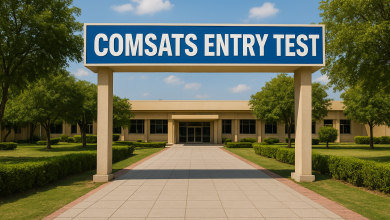O-Level Equivalence Certificate in Pakistan

Introduction:
For students in Pakistan who have completed their O Levels or are considering this internationally recognized qualification, obtaining an equivalence certificate is a crucial step in aligning their education with local academic standards. In this comprehensive guide, we will walk you through the process of acquiring an equivalence certificate for your O Levels, ensuring a smooth transition into the national education system.
The authority responsible for providing the equivalence certificate in Pakistan is the Inter Board Committee of Chairmen (IBCC). You can visit the IBCC website or contact them directly to gather information about the required documents, fees, and procedures. In this blog, we have covered in detail the prerequisites, documents required, and the fees for attaining the O-level equivalence certificate.
Eligibility Criteria
To be eligible for O levels equivalence certificate in Pakistan, you must have passed the following eight subjects:
- Mathematics
- English
- Urdu
- Islamiyat
- Pakistan Studies
- + Three electives
International students do not need to take Urdu, Islamiyat, and Pakistan Studies.

Documents Required
The following documents are essential for applying for O-Level equivalence certificate in Paksitan:
- Original O-Level certificate issued by Edexcel / Cambridge University
- Attested copies of your O Level result transcripts and certificates (Copies must be signed by the candidate)
- A copy of your National Identity Card (CNIC) or B-Form for Pakistani citizens.
- A valid visa for foreign nationals.
- Any other documents requested by the IBCC
Note:
- Please make sure that your original certificates are not laminated.
- Ensure that all documents are complete and attested as per the IBCC’s guidelines. The documents can be attested by any government worker working above the 16th scale.
Application Form
Download the equivalence certificate application form from the IBCC website or obtain a physical copy from their office. Fill out the form accurately, providing all necessary information and attaching the required documents.
Equivalence Certificate Fee
Pay the prescribed equivalence certificate fee, which can vary depending on the number of subjects and the urgency of the request. Payment details are available on the IBCC website. Keep the payment receipt as proof of payment.
Submit Your Application
Submit your application along with all supporting documents and the fee payment receipt to the IBCC office in person or via a courier service. Ensure that the application is complete and error-free to expedite the processing.
Wait for the Equivalence Certificate
The processing time for an equivalence certificate can vary, but you can track the status of your application through the IBCC website or by contacting their office. Once your application is approved, you will receive the equivalence certificate, which is essential for further education in Pakistan. While normal processing can take 1-2 weeks, urgent processing will take 2-3 days. However, it is important to check the updated information on the IBCC website.
Grade Conversion of GCSE/IGCSE/GCE O-Levels into Pakistani Marks
| Grades | Pakistani Marks |
|---|---|
| A* | Above 90 (From Examination Session 2021 Onwards) |
| A | 85 |
| B | 75 |
| C | 65 |
| D | 55 |
| E | 45 |
| F | Not applicable for IBCC Equivalence |
| G | Not applicable for IBCC Equivalence |
Example for Calculating O-Levels Equivalent Marks
Here’s the information for Pakistani National Students appearing in examination from Pakistan
| Sr. # | Subject of GCE ‘O’ Levels | Grade | Pakistani Marks |
|---|---|---|---|
| 1 | English Language | A* | 93 |
| 2 | Urdu | A* | 93 |
| 3 | Islamiyat | A* | 94 |
| 4 | Pakistan Studies | A* | 93 |
| 5 | Physics | A* | 94 |
| 6 | Chemistry | A* | 94 |
| 7 | Biology | A* | 94 |
| 8 | Mathematics | A* | 95 |
| TOTAL | 750 |
Calculation:
- Total Marks: ((750/800) * 1100 = 1031/1100) (SSC Equivalent Marks)
Why you might need an equivalence certificate?
If you are planning to pursue FA/FSc/ICS/I.Com after gaining qualifications and certificates from foreign educational boards such as British and American, you will need an equivalence certificate. Students planning to pursue higher education in medicine might choose to pursue FSc after O levels. Pursuing A level after matric is also possible, and you might need to obtain an overall equivalence certificate. Furthermore, many government universities and employers require an equivalence certificate.
Pursuing FSc after O levels might be tricky owing to the differences between the examination boards. Therefore, consider the pros and cons of doing FSc after O levels. There are many resources available online to make this transition easier. Additionally, you can invest in personal tutors to guide you.

Advantages of Pursuing FSc after O Levels:
A Solid Foundation in Sciences
One of the primary advantages of choosing FSc is the strong foundation it provides in the sciences. FSc is divided into two main categories: Pre-Medical and Pre-Engineering. Pre-Medical paves the way for students interested in pursuing careers in medicine, while Pre-Engineering is tailored for those aiming for engineering fields. The curriculum is designed to enhance your understanding of core scientific principles, preparing you for more specialized studies in these areas.
Seamless Transition to University
FSc is a natural progression for students who intend to attend local universities in Pakistan, particularly in the fields of medicine, engineering, or natural sciences. Completing FSc equips you with the prerequisite knowledge required for various undergraduate programs, streamlining the transition to university-level studies. It also serves as an excellent preparation for competitive entrance exams, such as the Medical College Admission Test (MCAT) or the Engineering College Admission Test (ECAT).
Access to a Wide Range of Specializations
FSc offers a diverse set of subjects within both Pre-Medical and Pre-Engineering streams. This allows students to explore different areas of interest before making a final decision about their future career path. Exposure to subjects like Biology, Chemistry, Physics, and Mathematics broadens your horizons, giving you the chance to discover your passions and strengths.
Conclusion:
Obtaining an equivalence certificate for your O Levels is a vital step for integrating your international education into the national academic framework of Pakistan. By following this step-by-step guide, you can navigate the process with confidence, ensuring a smooth transition to your chosen educational path in the country. Whether you’re planning to pursue higher studies or embark on a career in Pakistan, the equivalence certificate is your key to unlocking a world of academic and professional opportunities.



